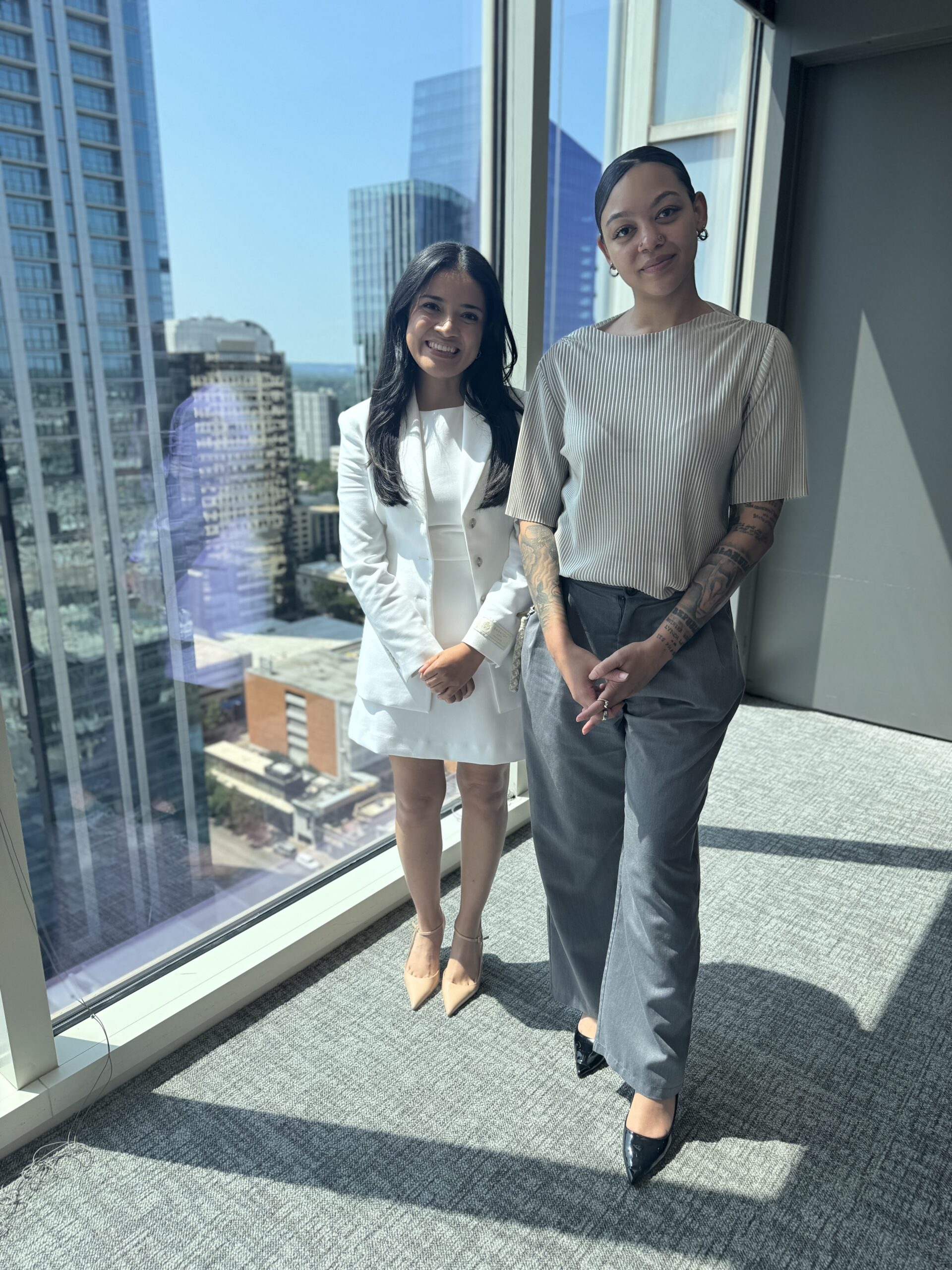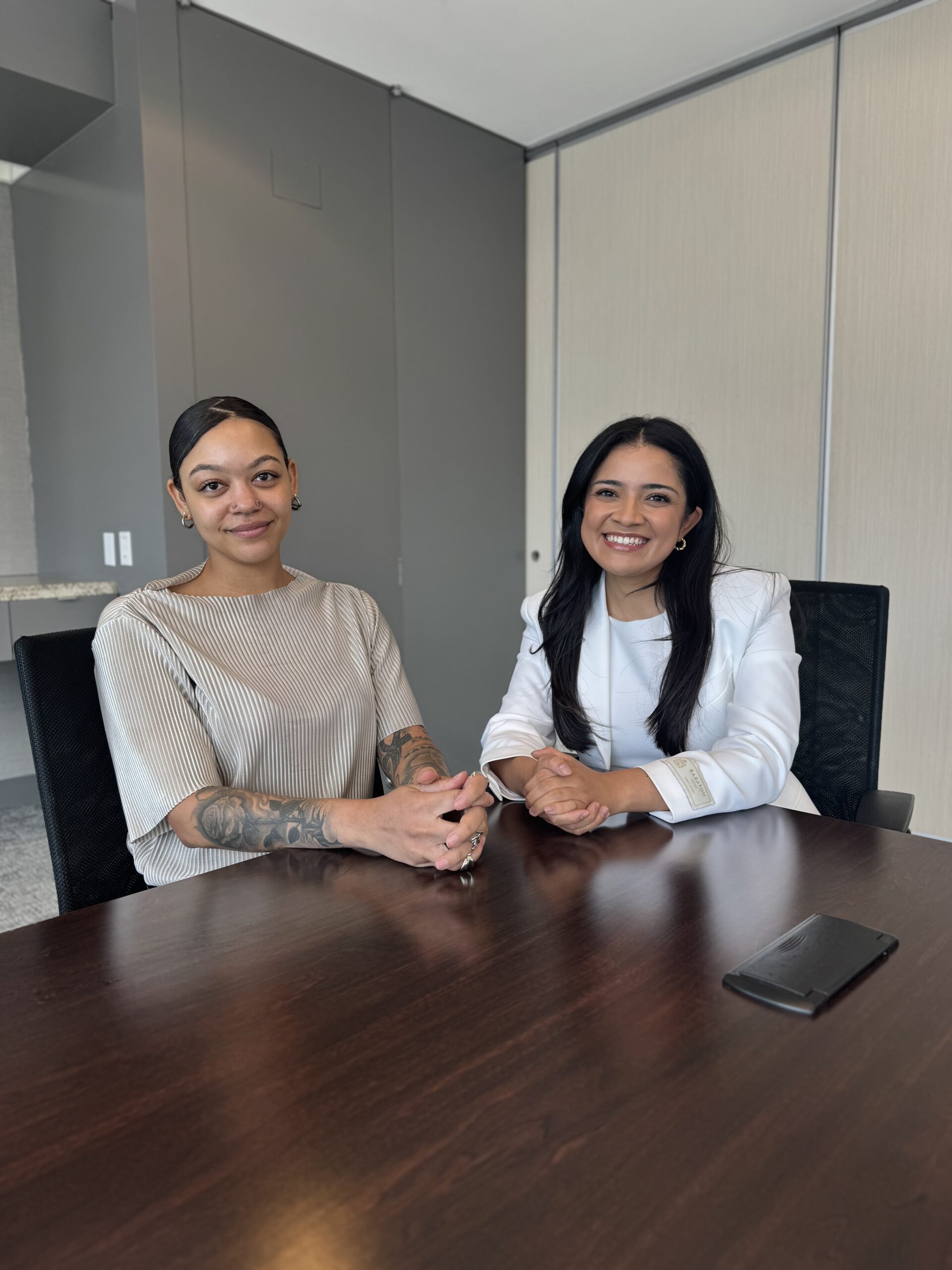As Kirkland & Ellis summer associates, Lizeth Badillo Garcia and Gabrielle Olubanke Howells returned to Austin from New Orleans last year mesmerized by the oral arguments they watched at the U.S. Court of Appeals for the Fifth Circuit.
On Thursday, Badillo Garcia and Howells will return to the court — this time to stand at the lectern.
Though they have yet to take the bar exam and before they officially join Kirkland as litigation associates later this year, the newly minted graduates will argue a pro bono case before a panel of judges, thanks to a partnership between Kirkland & Ellis and the University of Texas School of Law.
“It’s hard to put into words what I’m feeling,” Howells said. “I think the word that captures the feeling most effectively is probably ‘surreal.’”
“Sometimes I still can’t even believe that this is happening,” Badillo Garcia said. “I don’t think it’s going to sink in until we’re back in the courthouse.”

Kirkland Austin partner Zack Ewing had the idea for a collaboration after Badillo Garcia and Howells returned “gushing” about the experience of watching firm attorneys argue a compassionate release case last year on behalf of a Texas man serving a lengthy sentence for drug convictions.
How cool would it be to argue in the same courtroom one day, Ewing recalled them saying. Why couldn’t they, Ewing wondered.
While in his third year at the University of Pennsylvania Carey Law School, Ewing participated in a clinical partnership between the law school and a Philadelphia-area law firm that gave him an opportunity to argue a case on appeal in the Third Circuit. Ewing decided to use his platform at Kirkland to create a similar experience, which he hopes will continue as a formal program with the UT School of Law.
Ewing met with UT Law leadership and reached out to staff of the Fifth Circuit’s pro bono program, which assigns cases of pro se appellants to lawyers for pro bono representation. The staffer warned Ewing that the Fifth Circuit typically assigns only a handful of cases to pro bono lawyers each year and that the wait might be long.
About a month later, Ewing got the call that they’d been appointed to the case of Stephon Eric James, a Louisiana prisoner with a prosthetic eye who alleged he was denied appropriate care while in custody and who further accused doctors and prison officials of falsifying medical records.
“It’s this incredible thing to kickstart your career,” Ewing said. “The very first thing you can put on your resume is, ‘I argued a case in the Fifth Circuit.’ That’s what they get to do.”
A Career Path Shaken
Howells was born in Austin to a Nigerian father who immigrated to the United States as a young adult and to an American mother and small business owner.
Her father, wanting to become a doctor, obtained a bachelor’s degree in chemistry from UT. But unable to afford medical school, he turned to a career as a biochemist instead, Howells said.
As a child, Howells said she adopted her father’s dream of becoming a doctor. She went to UT, where she pursued an undergraduate degree in biology. But during her junior year, to fill a class schedule, she randomly picked a class on race, law and the U.S. society that she said “shook up my world.”
The class challenged her to see the world through a lens she never had before. She thought, “medicine has the power to heal bodies, but the law has the power to stop harms that exist in the first place.” She felt a tug toward law school.
Her father was a little disappointed at first, she said. But he could envision her as a lawyer. Growing up, she always had an answer for his questions and he would jokingly respond, “Ok, lawyer,” she said.
Howells initially attended law school at Thurgood Marshall School of Law in Houston but transferred to UT after the first year.
Honoring Family Sacrifices
Badillo Garcia was born in Guanajuato, Mexico, and was three years old when her parents moved to Austin.
While an undergraduate student at UT, Badillo Garcia gave birth to her son, Ezra, and pursued degrees in sociology, psychology and Latin American studies.
When she was a junior, she thought to herself, “What am I going to do with these majors?” She wanted a career that would challenge her to continue critical thinking and that would honor her parents “and hopefully, one day, repay them for their sacrifices and their hard work.”
She felt it would be deeply meaningful for someone from her community — Spanish-speaking and Mexican — to represent migrants, many of whom shared her background.
Badillo Garcia became the first college graduate in her family when she graduated from UT. She went on to attend UT Law School and walked the stage with her son last month.
A Full Circle Moment
In New Orleans, the night before former Kirkland lawyer Nadia Haghighatian (now a shareholder at Winstead) was set to argue the compassionate release case, the summer associates went out to dinner. After dinner, at the behest of their supervisors, the summer associates enjoyed a night on the city’s famed Bourbon Street.

They woke up early the next morning and walked together to the federal building where the Fifth Circuit sits. Howells’ heel chipped from grating across the city’s cobblestone walkway.
Badillo Garcia took in the picturesque courtroom — the mahogany wood and the marble. Howell was impressed with Haghighatian’s unique take on the case. At the end, one of the judges thanked the firm for taking the case on a pro bono basis.
“We were both very marked by that experience,” Badillo Garcia said.
The experience this time will be markedly different, they said, as they work to manage their nerves, finetune their presentations and prepare for the unpredictable questions from the panel.
They’re ready, Ewing said. Under his supervision, Badillo Garcia and Howells authored their own brief and reply. He wanted them to obtain a true mastery of the case.
“An important way to learn how to practice law is to take complete ownership and they did every step of the way,” Ewing said. “It’s remarkable the way that they have really just shown up for our client, and have committed so much of themselves to this case.”
Badillo Garcia and Howells each showed a willingness to directly answer tough questions, an awareness to respond through a strategic but helpful lens and an ability to pivot when they needed to, said UT Law professors Lisa Eskow and Erin Busby, co-directors of the school’s Supreme Court Clinic who helped prepare Badillo Garcia and Howell.
“That kind of composure and maturity is not easy to come by,” Eskow said.
“They had clearly given real thought to how the strong points and weak points in the record would affect their case and the best arguments that they had to bring,” Busby added.
Badillo Garcia and Howells plan to visit the courtroom Wednesday afternoon to get a final lay of the land before having an early dinner.
In the gallery on Thursday, Howells will have her older sister and some relatives who live in Louisiana. From Nigeria, her father will be listening to the court’s livestream. Badillo Garcia’s parents and her son will also likely listen to the livestream.
“The fact that it’s going to be Gabby and I delivering oral argument just a year later is pretty crazy,” Badillo Garcia said. “And I am just really grateful.”
“I rarely take time to just sit in the moment because I’m constantly doing something,” Howells added. “But I’ve been consciously trying to do that in the days leading up to the arguments … I feel very lucky, super nervous and just ready to go in there and give it my all and, hopefully, give half as good a performance as the one I was able to sit in there and see last year.”
